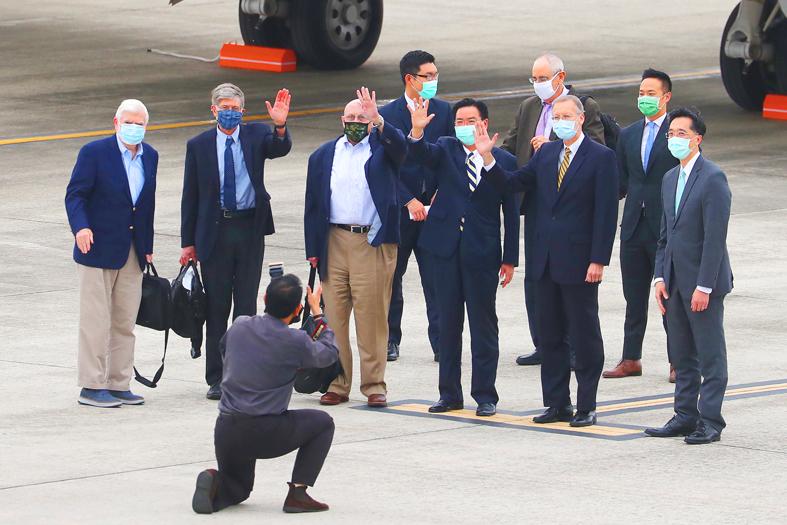The government yesterday welcomed an “unofficial” delegation sent by US President Joe Biden, while another delegation led by US Special Presidential Envoy for Climate John Kerry was headed to Shanghai.
Biden’s first delegation to Taiwan is made up of former US senator Chris Dodd, and former US deputy secretaries of state Richard Armitage and James Steinberg.
They are to stay in Taiwan until tomorrow.

Photo: CNA
Their arrival, on a chartered flight, had been kept confidential until media reported the visit yesterday morning, after which the Ministry of Foreign Affairs issued a short notice that they were expected to arrive at 2:40pm.
The flight landed at about 3:05pm at Taipei International Airport (Songshan airport), where the delegation was received by Minister of Foreign Affairs Joseph Wu (吳釗燮), American Institute in Taiwan Director Brent Christensen and other officials.
“We hope you enjoy your visit & look forward to working together to strengthen the #Taiwan #US partnership,” President Tsai Ing-wen (蔡英文) wrote on Twitter.
Tsai is due to meet with the US officials at the Presidential Office in Taipei at 10am today and host a dinner with them at her official residence in the evening, Presidential Office spokesman Xavier Chang (張惇涵) said in a statement.
Dodd is known for his friendship with Biden and he was a crucial advocate of the US’ Taiwan Relations Act, which took effect in 1979, Chang said.
Armitage and Steinberg served as deputy secretaries of state during the administrations of former US presidents George W. Bush and Barack Obama respectively, he said, adding that they have visited Taiwan several times and have been friendly toward the nation.
Over the past weeks, the ministry had been exchanging opinions with its Washington counterpart about the visit, ministry spokeswoman Joanne Ou (歐江安) said, without saying when the plan was finalized.
Biden sending a heavyweight delegation to Taiwan less than three months since his inauguration — at a time when many important positions in his administration are not yet filled — shows Washington’s consistent support for Taiwan and “rock solid” bilateral ties, the ministry said in a news release.
The delegation is to meet with Tsai, Wu and Premier Su Tseng-chang (蘇貞昌) to discuss many critical issues related to bilateral ties, it said.
Meanwhile, Kerry was to arrive in Shanghai yesterday evening and is to stay until tomorrow.
His visit marks the first to China by an official in the Biden administration.
Kerry is to travel to Seoul on Saturday, ahead of a US-hosted two-day virtual climate summit starting on Earth Day on Thursday next week.
Asked about the planned agenda for the meeting between Chinese Special Envoy on Climate Change Xie Zhenhua (解振華) and Kerry, and whether Chinese President Xi Jinping (習近平) would accept Biden’s invitation to the summit, Chinese Ministry of Foreign Affairs spokesman Zhao Lijian (趙立堅) on Tuesday said that no information could be offered at that time.

NATIONAL SECURITY THREAT: An official said that Guan Guan’s comments had gone beyond the threshold of free speech, as she advocated for the destruction of the ROC China-born media influencer Guan Guan’s (關關) residency permit has been revoked for repeatedly posting pro-China content that threatens national security, the National Immigration Agency said yesterday. Guan Guan has said many controversial things in her videos posted to Douyin (抖音), including “the red flag will soon be painted all over Taiwan” and “Taiwan is an inseparable part of China,” while expressing hope for expedited “reunification.” The agency received multiple reports alleging that Guan Guan had advocated for armed reunification last year. After investigating, the agency last month issued a notice requiring her to appear and account for her actions. Guan Guan appeared as required,

A strong cold air mass is expected to arrive tonight, bringing a change in weather and a drop in temperature, the Central Weather Administration (CWA) said. The coldest time would be early on Thursday morning, with temperatures in some areas dipping as low as 8°C, it said. Daytime highs yesterday were 22°C to 24°C in northern and eastern Taiwan, and about 25°C to 28°C in the central and southern regions, it said. However, nighttime lows would dip to about 15°C to 16°C in central and northern Taiwan as well as the northeast, and 17°C to 19°C elsewhere, it said. Tropical Storm Nokaen, currently

‘NATO-PLUS’: ‘Our strategic partners in the Indo-Pacific are facing increasing aggression by the Chinese Communist Party,’ US Representative Rob Wittman said The US House of Representatives on Monday released its version of the Consolidated Appropriations Act, which includes US$1.15 billion to support security cooperation with Taiwan. The omnibus act, covering US$1.2 trillion of spending, allocates US$1 billion for the Taiwan Security Cooperation Initiative, as well as US$150 million for the replacement of defense articles and reimbursement of defense services provided to Taiwan. The fund allocations were based on the US National Defense Authorization Act for fiscal 2026 that was passed by the US Congress last month and authorized up to US$1 billion to the US Defense Security Cooperation Agency in support of the

PAPERS, PLEASE: The gang exploited the high value of the passports, selling them at inflated prices to Chinese buyers, who would treat them as ‘invisibility cloaks’ The Yilan District Court has handed four members of a syndicate prison terms ranging from one year and two months to two years and two months for their involvement in a scheme to purchase Taiwanese passports and resell them abroad at a massive markup. A Chinese human smuggling syndicate purchased Taiwanese passports through local criminal networks, exploiting the passports’ visa-free travel privileges to turn a profit of more than 20 times the original price, the court said. Such criminal organizations enable people to impersonate Taiwanese when entering and exiting Taiwan and other countries, undermining social order and the credibility of the nation’s